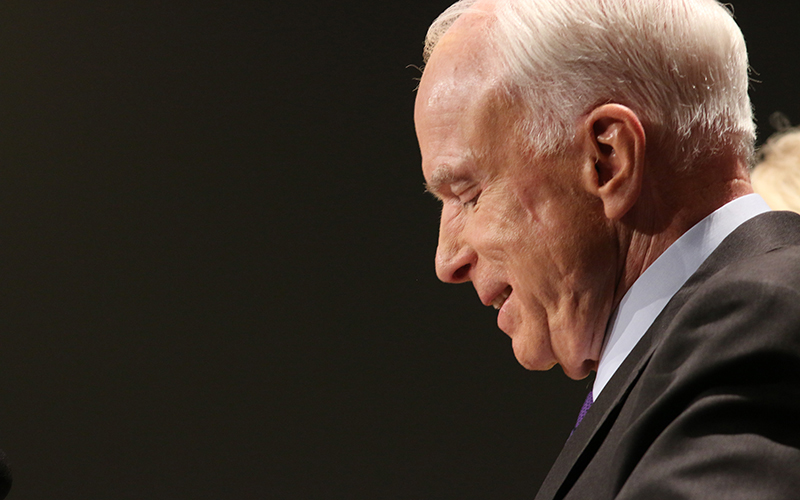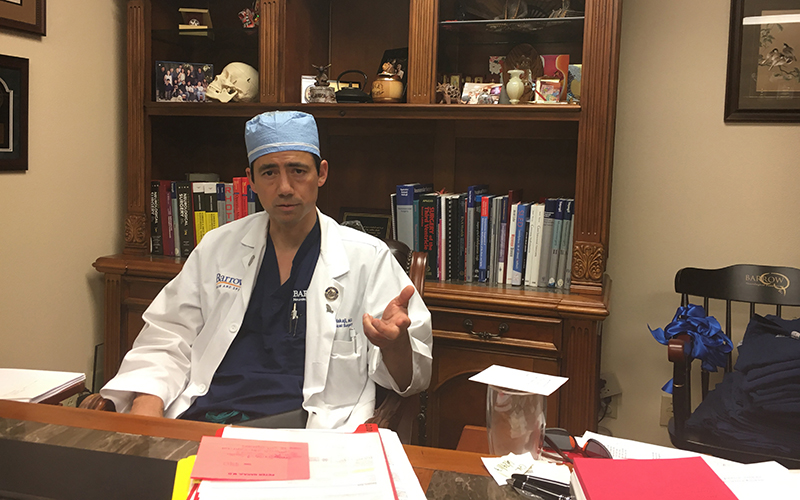
Arizona Sen. John McCain, who has been receiving treatment for the last year for glioblastoma, a deadly form of brain cancer, announced Friday that he is discontinuing his treatment. (Photo by Staff/Cronkite News)
WASHINGTON – Sen. John McCain has discontinued treatment for the deadly brain cancer he has been living with since last summer, his family announced Friday.
The six-term Republican announced his diagnosis of glioblastoma in July 2017 and has already beaten the odds against the very aggressive form of cancer. It can be particularly hard on patients older than 50 – McCain’s 82nd birthday is Wednesday.
But the family’s announcement, released Friday by McCain’s Senate office, said that while he “has surpassed expectations for his survival…. the progress of disease and the inexorable advance of age render their verdict.”
“With his usual strength of will, he has now chosen to discontinue medical treatment,” the statement said. “Our family is immensely grateful for the support and kindness of all his caregivers over the last year, and for the continuing outpouring of concern and affection from John’s many friends and associates, and the many thousands of people who are keeping him in their prayers. God bless and thank you all.”
Neurosurgeons and brain tumor experts said Friday it’s hard to tell how this decision will affect McCain’s prognosis.
Dr. Walter Jean, a professor of neurological surgery at George Washington University Hospital, said prognoses, treatment plans and life expectancies vary widely depending on a patient’s health, age and reaction to treatments, which typically include surgery, chemotherapy and radiation.
“It’s an impossible problem to guess at the answer,” he said. “It’s important for people to realize that we don’t have crystal balls.”
-Cronkite News video by Daniel Perle
But Jean stressed that McCain’s prognosis cannot be based solely on his age – he was in good health to begin with, which has likely helped him fight the tumor.
“People perhaps initially had a very bad expectation because they look at him as, ‘Oh, he’s old and age is not in his favor from the get-go,'” Jean said. “But it was more driven by his baseline health than his age.”
Though glioblastomas are typically treatable, Jean said they are ultimately not curable.
Dr. Deepa Subramaniam, director of MedStar Georgetown University Hospital’s Brain Tumor Center, said that while older patients typically have a harder time fighting glioblastomas, McCain is currently at the median survival rate for all patients with the disease.
There are some “extreme survivors” who live for years with a glioblastoma, she said, but patients are typically expected to live a year or a year and half after their diagnosis.
Subramaniam said there are many reasons McCain could have chosen to stop treatment, and not all of them mean he is giving up hope.
Sometimes patients don’t want to deal with the side effects of the treatments and some patients who are weaker physically can’t handle the treatments, she said. Others just want to take control over the quality of the end of their life.
“It’s a redirection of efforts,” Subramaniam said. “We redirect our hopes from living longer to hopes of living better.”
There is lots of research currently being done on glioblastomas and Subramaniam believes doctors may be on the verge of a medical revolution. With the research being done now, she thinks glioblastoma could become a disease doctors can treat similarly to other forms of cancer.
McCain announced his diagnosis on July 19, 2017, less than a week after he had been hospitalized for removal of a suspicious blood clot over his left eye. The Mayo Clinic in Phoenix, where McCain underwent the blood-clot surgery, said at the time that McCain’s underlying health was excellent and his office said he was in good spirits.
But the Mayo Clinic website also said that glioblastoma is an “aggressive type of cancer that can occur in the brain or spinal cord,” and that it can “be very difficult to treat and a cure is often not possible.”
According to the American Cancer Society, glioblastoma tumors are a fast-growing category of brain tumors that begin in the glial cells, which surround the central nervous system. It is the same type of cancer that killed Sen. Ted Kennedy, D-Massachusetts, in 2009 and killed former Vice President Joe Biden’s son, Beau, in 2015.
McCain returned to the Capitol in late July 2017 when he cast a critical early-morning vote that salvaged Obamacare. He remained in Washington through the fall, and was honored in October with the National Constitution Center’s Liberty Medal in Philadelphia.
At that event, McCain made an emotional appeal for the U.S. to rediscover its values and to reject the “half-baked, spurious nationalism cooked up by people who would rather find scapegoats than solve problems” – an apparent reference to President Donald Trump, with whom he often sparred.
It was one of many awards, and several calls to action by McCain after his diagnosis. But by the time he was being honored this spring at his alma mater, the U.S. Naval Academy, the senator was back in Arizona receiving treatment and too ill to travel.
The Naval Academy honor was accepted on McCain’s behalf by Biden, a longtime Senate friend, who said the Arizona senator and Navy veteran had lived a “life of honor, decency, duty and devotion to his country like none other in modern American history.”
“Like my Beau, John has never bent, never bowed and never, ever yielded,” Biden said. “And he has never given up hope.”
The news of McCain’s diagnosis brought an outpouring of support from friends and political foes alike.
Fellow Arizona Republican, Sen. Jeff Flake, said of McCain at the time, “Tough diagnosis, but even tougher man.” Former President Barack Obama tweeted: “John McCain is an American hero and one of the bravest fighters I’ve ever known. Cancer doesn’t know what it’s up against. Give it hell, John.”
McCain’s daughter, Meghan, called her dad “a warrior at dusk, one of the greatest Americans of our age, and the worthy heir to his father’s and grandfather’s name.”
“But to me he is something more. He is my strength, my example, my refuge, my confidante, my teacher, my rock, my hero – my dad,” she wrote.
